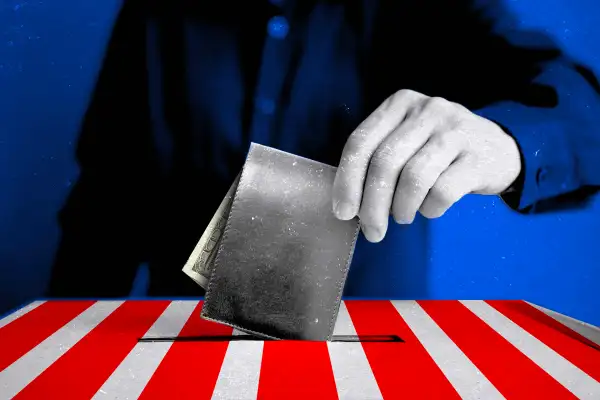How the Midterm Elections Could Affect Inflation, Taxes and the Economy

Tuesday's midterm elections come at a turbulent time for the U.S. economy: Inflation has been running at four-decade highs for months, gas prices are on a rollercoaster, and student loan forgiveness got stopped before it could start.
Needless to say, you should go vote. But before you cast your ballot, you should be clear on what's at stake for your wallet.
On a state level, there are several explicitly money-related proposals up for consideration. In Nebraska, Initiative 433 would raise the minimum wage from $9 to $15 by 2026. In Arizona, Proposition 209 would bring down the maximum interest rate on medical debt from 10% to 3%. And in Massachusetts, Question 1 would amend the state constitution to increase taxes for millionaires.
But nationally, the big question is which party will take control of Congress. Right now in the Senate, Democrats have the majority because although there are 50 seats held by Republicans and just 48 held by Democrats, the two Independent seats lean left — and Vice President Kamala Harris is the tiebreaker. In the House, 220 of the seats are held by Democrats and 212 are held by Republicans. (Three are vacant.)
The midterms, which will decide the fate of all 435 House seats and more than 30 Senate seats, could change the math.
In polls, voters regularly say the economy and inflation are their top concerns. Candidates know that, so they’ve been campaigning hard around those issues.
“A lot of people are hitting [President Joe] Biden with ‘he’s not doing anything, he’s not doing enough,’” says Michael Snipes, an economics instructor at the University of South Florida Sarasota-Manatee. “Democrats are hitting back that ‘the Republicans are blocking things, the Republicans aren't doing anything.’”
How the midterms could impact inflation
The party that controls Congress will lead the government’s response to the state of the economy, which has a ripple effect. But speaking in terms of black-and-white cause-and-effect, Congress doesn’t really have the ability to directly bring down inflation, says Scott Imberman, an economics and education professor at Michigan State University.
That’s largely in the hands of the Federal Reserve, which has been ratcheting up interest rates in an attempt to get our 8.2% inflation closer to 2%. The Fed is independent, so it’s not influenced by the party in power (at least in theory). Its chair, Jerome Powell, just got sworn in for a second term, so he’s not going anywhere soon.
“The irony is that inflation is first and foremost on people's minds... and something the president and Congress can do the least about,” Imberman says.
Gas prices, which are tied closely to international factors, are in the same bucket. Imberman says Congress could potentially bring down prices by enacting a gas tax holiday or ordering the release of petroleum reserves (as Biden has done), but that impact is going to be pretty small.
Rather than trying to directly decrease inflation or gas prices, Congress could make moves to increase Americans’ income, therefore boosting their purchasing power, Snipes says.
That’s something that may be influenced by the midterms: Progressives like Sen. Bernie Sanders want to raise the federal minimum wage to $15 an hour. Republicans have been hesitant to do that (last year, Sens. Mitt Romney and Tom Cotton introduced a bill to make it $10; The Guardian described the proposal as having “little chance of getting any serious consideration”).
Snipes says Congress could crack down on corporations, too, using antitrust legislation to encourage competition and bring down prices. Imberman adds that Congress could codify broad-based student debt relief.
The idea is that legislators would free up dollars in folks' inflation-constrained budgets to spend on rent and groceries, making those bills less painful. But that depends on the majority party and its priorities.
The looming fight over taxes
Caroline Bruckner, a tax professor at American University, says that perhaps the most imminent, immediate money impact people could see from the midterms has to do with the IRS.
Not only because there’s a new acting commissioner — Douglas O’Donnell, named last week — but also because the IRS has some $80 billion in additional funding to spend, thanks to the Inflation Reduction Act.
This tees up a fight. Republicans want to repeal that provision, saying that they don’t want the IRS to use the money to hire workers who will go after taxpayers with unnecessary audits. Meanwhile, Democrats claim that there’s not enough compliance accountability because the IRS can’t seem to hire anyone.
Bruckner says there are also a whole slew of annual tax provisions to be extended before the end of the year. Whether the parties hammer out a deal is contingent upon the midterms: “If the Republicans have a landslide election, where's the incentive to negotiate with the Democrats?” she says.
One final point: Some of the politicians elected in these midterms will end up dealing with the expiration of the 2017 Tax Cuts and Jobs Act. Republicans will want to expand those tax cuts; Democrats will want to set new priorities.
“That is a looming, multi-billion-dollar issue that is going to impact not only the next Congress but the presidential election in a huge way,” Bruckner says. “Whether or not voters recognize it, that's on the ballot this election.”
More from Money:
True or False? Gas Prices Always Fall Before Elections
Election Day ‘I Voted’ Stickers Are Everywhere. Who Pays for Them?
You Can Make Some Quick Cash on Election Day By Being a Poll Worker

